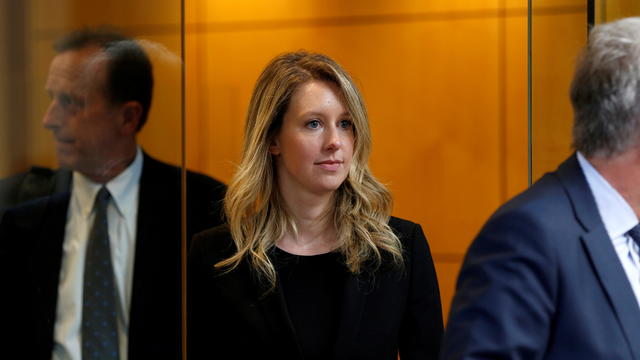Ex-Theranos founder Elizabeth Holmes set to face fraud charges

Ex-Theranos founder Elizabeth Holmes set to face fraud charges
The fraud trial of Theranos founder Elizabeth Holmes kicked off Tuesday with jury selection, casting a spotlight on the fallen Silicon Valley star. Holmes, a Stanford dropout who was once compared to Steve Jobs, faces felony charges alleging she duped elite financial backers, customers and patients into believing that her startup was about to revolutionize medicine.
Theranos’ technology promised to run hundreds of medical tests using a single drop of blood, but it never lived up to expectations — and may never have worked at all.
Once a jury is seated, the trial will begin in San Jose, California, with opening arguments scheduled early next week.
“The next Steve Jobs”
Holmes launched Theranos after dropping out of Stanford University in 2003. The startup, whose name derives from the words “therapy” and “diagnosis,” quickly achived billion-dollar valuations. Business magazines hailed the similarities between Holmes and Apple co-founder Steve Jobs, whom she embraced as a role model. At one point, her fortune of $4.5 billion, tied to her personal stake in the company, gained her accolades as the youngest self-made female billionaire.
But Theranos quickly lost steam after revelations that its supposedly breakthrough blood-testing machine, called “Edison,” didn’t work as Holmes had described and produced dangerously inaccurate results in tests run for actual patients.
Holmes now faces the prospect of being remembered more like Bernie Madoff, the once-revered New York financier whose name became synonymous with fraud after he pled guilty to bilking billions of dollars through an illegal Ponzi scheme.
The charges
Holmes and Theranos’ chief operating officer, Ramesh “Sunny” Balwani, are accused of orchestrating a multi-billion-dollar scheme to defraud investors and to defraud doctors and patients who paid for the company’s blood testing services. The two are being tried in separate trials, and both have pleaded not guilty.
Holmes faces 10 counts of wire fraud and two counts of conspiracy to commit wire fraud. If convicted, she could spend up to 20 years in and pay a $250,000 fine, as well as paying restitution for each count.
The Department of Justice alleges that Theranos overstated how much money the company was making, and that its founders knew the “Edison” technology was not capable of running a full range of clinical tests on a few drops of patient blood, but nonetheless promoted it as capable.
Holmes’ trial was delayed by the pandemic and then a pregnancy that culminated in the birth of her first child. The ex-founder, now 37, was in court Tuesday. She has maintained her innocence since the U.S. government charged her in 2018.
The trial
More than 200 people were summoned for the jury pool in an effort to seat an impartial panel. Jurors were given a lenghthy questionnaire and questioned about their consumption of news, among other issues.
Holmes’ saga has received wide attention thanks to “Bad Blood,” a book by a Wall Street Journal investigative reporter whose stories led to her company’s downfall. The book led to an HBO documentary called “The Inventor” and a soon-to-be-released TV miniseries called “The Dropout,” starring Amanda Seyfried as Holmes.
Over the course of the next three months, the trial is expected to provide moments of high drama, featuring a cast of billionaire Theranos investors and influential figures that sat on the company’s board. Also expected to testify are 11 patients and nine doctors who were affected by the company’s inacurate test results, according to KPIX.
Investors who contributed much of the roughly $900 million that Theranos raised include media magnate Rupert Murdoch, Walmart’s Walton family, the family of former U.S. Education Secretary Betsy DeVos and Mexican business mogul Carlos Slim.
Theranos’ well-connected board included former U.S. Secretary of State Henry Kissinger, former U.S. Defense Secretary Gen. James Mattis, former U.S. Secretary of State and former U.S. Treasury Secretary George Shultz (now deceased) and former Wells Fargo Bank CEO Richard Kovacevich.
The defense
Holmes may take the witness stand to defend herself, based on court documents filed leading up to the trial. Recently unsealed court filings indicate that she may try to pin the blame on Balwani, with whom she was in a relationship while he was Theranos’ COO. According to those documents, she plans to testify that some of her statements and actions while running Theranos were the result of “intimate partner abuse” inflicted by Balwani.
Balwani’s attorney has denied Holmes’ allegations.
The court has dismissed the idea of using naivete or being gullible as a defense, KPIX reports. The government expressed concerns Holmes would argue that her business conduct was in line with broader Silicon Valley cullture, in which founders hype their businesses to raise funding and that she was singled out, the outlet reports. The court said in an order that Holmes has vowed not to argue she was singled out and that it will allow “general fair comment” on the marketing of startups.
Central to the trial will be questions of what Holmes knew and whether she intended to deceive, legal experts say.
“The most difficult thing to prove is intent,” Thomas Joo, a professor at the University of California-Davis School of Law told KPIX. “Did she intentionally lie in order to trick people?”
KPIX and Len Ramirez contributed reporting.



